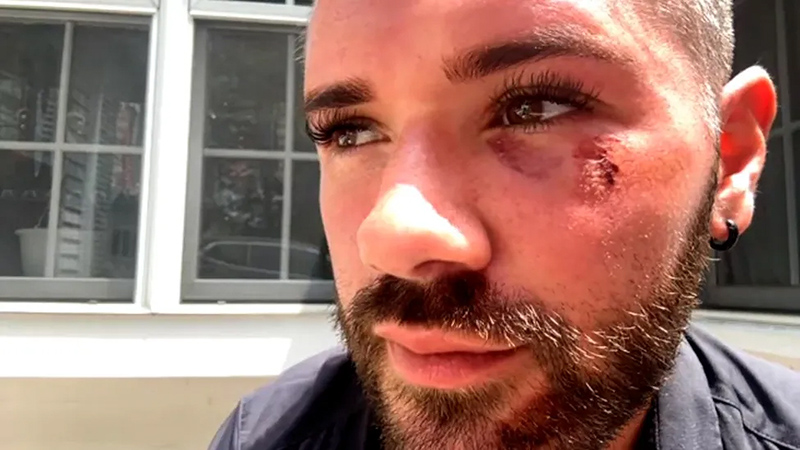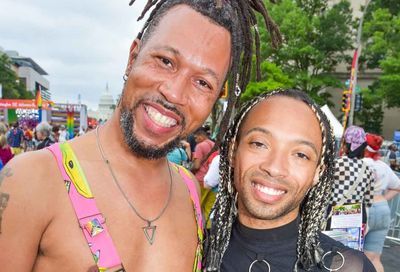Unsteady Cabin: Log Cabin endorsed Trump, but LGBTQ Republicans are split
According to one Republican, "the only people left [at Log Cabin] are the weirdest, kookiest, crunchiest Trumpistas"

“There is no world where I can sit down at the dining room table and explain to my children that I just endorsed Donald Trump for president.”
So said Jennifer Horn, former board member of Log Cabin Republicans, in an interview with the Washington Post last month. Horn and a number of other high-profile Log Cabin members publicly — and loudly — resigned from the conservative LGBTQ organization after the board voted to endorse President Donald Trump for re-election.
It ignited a firestorm within Log Cabin, one that culminated in Jerri Ann Henry, Log Cabin’s Executive Director, quitting after less than a year as the group’s first female leader. Speaking to CNN, Henry criticized the board for the endorsement and slammed the overall direction of Log Cabin, saying it was “once a civil rights organization with conservative principles…[but now] it’s mostly about happy hours,” noting that Log Cabin was not “involved in the marriage fight at all,” and that “no one said anything” when the Equality Act passed the House earlier this year.
Asked if Log Cabin could survive the endorsement, she said, “I’m not sure. My recommendation would be to shut it down, or just become the [Young Republicans] of the gay community — Republicans who just happen to be gay.”
Despite Henry’s resignation — and the wave of criticism that followed the endorsement — Log Cabin has doubled down on its support of Trump, touting actions they perceive to have benefitted the LGBTQ community, such as promising to end the HIV/AIDS epidemic in 10 years, and appointing openly gay people to positions within his administration, including former Log Cabin Executive Director R. Clarke Cooper to the State Department and Richard Grenell as U.S. Ambassador to Germany.
And Charles Moran, spokesman for the national organization, tells Metro Weekly that, far from a snap decision to curry favor with the administration, the Trump endorsement was based on feedback from individual chapters.
“Log Cabin Republicans didn’t endorse President Trump in 2016,” says Moran. “In that election, the majority of our chapters voted to endorse, but the Board of Directors opted not to.”
Moran appreciates that some LGBTQ Republicans — particularly those more closely tied to the D.C. GOP establishment — remain hesitant about supporting Trump. But he says Log Cabin, “as a grassroots organization,” is obliged to listen to the “mandate” from its chapters, after they “reached out to the national board and said, ‘We want you to move faster on this this year, and we want you to take our voice in consideration.'”
And while Henry claims that Log Cabin is only concerned with “happy hours,” Moran says that, beyond endorsing presidents, the organization fields candidates for office, raises money, helps staff campaigns, and is “an important voice within the LGBTQ community.”
“We have a very aggressive effort during Pride season where we go to the festivals, where we have booths, where we talk about the context of homosexuality within the equality community, where just because you’re gay doesn’t mean that you have to support crazy Green New Deal, or some of these other intersectionality issues which we believe the left is trying to conflate with an equality agenda,” he says. “So we provide that counterbalance and give people that voice to say, ‘I’m gay but I’m not buying in to some of the crazy that’s coming out of the Democratic Party today.'”
Moran also asserts that the Left has overemphasized the threat Trump poses to LGBTQ rights.
“President Trump has stated on more than one occasion, he does not believe in discrimination based on sexual orientation, he supports an equality agenda around gay and lesbian [people] being treated openly, and fairly, and honestly, and I think that that’s congruent from his life as a philanthropist and a businessman, and now as a politician.”
He also believes that Trump has “flipped the script in terms of not engaging in the anti-gay playbook that has existed in the past in the Republican Party.”
“That tone has changed, and we think that that’s important because we’re tired of our community being used as a political wedge in the Republican Party. We see…it as something that’s been wholly good for the Republican Party and for America, because we don’t want to be used as a punching bag anymore.”
Asked about the Trump administration’s attacks on LGBTQ rights — including banning transgender people from the military and arguing that LGBTQ people should be discriminated against nationwide — Moran says that many of these issues involve a great degree of nuance and blames the president’s opponents and the media for the way they’re discussed. In addition, Moran accuses most national LGBTQ organizations, which he refers to as “Gay, Inc.,” of being overtly partisan and biased against Trump.
“After President Trump got elected, I think there really was an opportunity to reset the relationship with Republicans,” he says. “I was hopeful that there would be new lines of dialogue between these LGBT umbrella organizations…. But instead, it turned out to be just a flat rejection of President Trump, a rejection of his election, and everybody moved into ‘resist’ mode.”
Drew Anderson, director of news and rapid response for GLAAD, rejects Log Cabin’s argument, pointing to the sheer number of times his administration has attacked LGBTQ people.
“If they want to tout the visual of Donald Trump holding the gay pride flag upside down, that is fine,” Anderson says, referring to of one of the 2016 campaign’s iconic images. “However, I would say the facts and actions are speaking louder than the rhetoric that Donald Trump, and quite frankly, others are saying…. The Trump administration has attacked LGBTQ Americans, in policy and rhetoric, 124 times since 2017. So from GLAAD’s perspective, we don’t see how they can come to the conclusion that Donald Trump is a friend to the community, because of that number alone.
“And it’s not what they say, it’s what they lack in saying that also matters,” he continues. “It’s noteworthy that President Trump did not acknowledge Pride Month until this year. That kind of silence is a response. Those are easy hurdles that any other president or political figure could hop over, and acknowledge a marginalized community, but it appears Donald Trump only wants to do it when it benefits him.”
As for Moran’s claim that “Gay, Inc.” is overly critical of Trump, Anderson notes that GLAAD — a nonpartisan organization — has called out congressional Democrats like Dan Lipinski or Joe Manchin when they take anti-LGBTQ actions. He adds that GLAAD was correct in its prediction that a Trump victory in 2016 would embolden anti-LGBTQ forces.
“When LGBTQ groups saw Donald Trump picking Mike Pence as his VP candidate, they knew that if Trump were to win the presidency, it would not be a favorable administration for LGBTQ acceptance,” Anderson says, highlighting Pence’s anti-LGBTQ record as Governor of Indiana. “That is why, from the get-go, we have been very adamant to hold the Trump administration accountable, because of that fact.”
Anderson emphasizes how quickly anti-LGBTQ attitudes took hold in Trump’s administration, noting “the moment he was sworn in as president, [they] wiped away all [online] references to the LGBTQ community. The actions since being inaugurated back up that LGBTQ Americans will never be viewed as equals by the Trump administration.”
Rich Tafel, a former Log Cabin executive director who has also resigned from the organization due to the endorsement, says that while there’s a certain logic for Log Cabin to throw its support behind the president, the way it was handled and the optics of people resigning in protest — particularly lesbian members in a party that has struggled to recruit female talent and voters — are terrible.
“That’s just unfortunate, and I think it doesn’t reflect well on the organization to not reach a more collaborative strategy for the endorsement,” Tafel says. “Because I think there’s a case for an endorsement, but the way the whole thing has been handled, it’s extremely unfortunate, and could have, potentially, an extremely damaging impact on the organization’s brand going into the future, which is very sad.”
Regarding the rationale for a Trump endorsement, Tafel notes that because Log Cabin declined to endorse Trump in 2016, younger LGBTQ Republicans will have missed out on jobs or appointments in the administration that could have placed them in positions to influence policy for the better.
“I think they’re trying to make up for that and say to the administration, ‘Look, we’re loyal,'” Tafel says. “This administration’s ruthless, almost unlike anything I’ve seen, of you being either for or against us…. Because they have been sort of frozen out since they didn’t endorse, and I think that’s probably driving some of the behavior.”
However, he is frustrated at the lack of negotiation between Log Cabin and the Trump campaign for the endorsement, noting that as leader of Log Cabin he worked with the Bush campaign in 2000 prior to endorsing. “It would have been much smarter to say, ‘Let’s work this trans military issue,’ for example. ‘And let’s negotiate on that.'”
Tafel says matters are complicated further because “on many issues, [Trump is] not anything that a Republican would have been, say 10 years ago.”
“This president at his core is not a conservative. He is erratic, he is unpredictable. He is petty, he’s narcissistic. Conservatives have forfeited a lot of their basic principles, so we’re in a period now where it’s just tribal. And in a sense, Trump’s big success within the Republican party was that he was able to troll the Left more successfully and be kind of a thug for the Right in a way that the traditional Republicans couldn’t. That’s what people were attracted to, they wanted, in a sense, a bully, because they perceived the Left as a bully.”
Adam Savit, president of Log Cabin’s D.C. chapter, has witnessed a change in support among chapter members since Trump took office. In 2016, a narrow majority in D.C. voted against endorsing Trump. This year, over 80 percent supported an endorsement.
“There’s always been some tension,” he says. “The people who were very, very anti-Trump cleared out before I came on, as a statement after he got nominated and won the election. There’s all kinds of friendly disagreements and arguments back and forth with the people that support and don’t support. But I think gradually every month, and through the last couple of years, support grows. It’s a direct parallel to the Republican Party overall, in that at first there was chaos, but over time you either reconcile yourself to him and begin to like him in some way, or you find elsewhere to express yourself.”
While dissent is still allowed, Savit acknowledges that Log Cabin — and the larger GOP — has embraced a more populist, pro-Trump worldview.
“I would argue that the more populist direction has actually been a good thing, from a gay angle, because beforehand there was more influence from the Religious Right and a traditional moral perspective, whereas populism is a more working-class, live-and-let-live [attitude],” he says. “I think that appeals to Republicans. I’ll speak for myself, but I think there’s this significant section that feels that we would rather issues of sexuality not be an issue anymore. Basically be de-emphasized. Not that there’s nothing left, but the fact that marriage is there, and gays in the military is solid, and Trump has said he has no interest in rolling back marriage, the more general issues of life are what we’re voting on and deciding on.”
But Joey Swartz, a 35-year-old former Republican from Laurel, Md., says he left the party precisely because he feels that the GOP has become a cult of personality.
“I subscribe to the thought process that in terms of gay rights, Trump is going to do very little, if anything, to harm it,” he says. “But there is this cultishness around Trump — and this is what has happened at LCR both in the local and national chapters. We’ve gone from being a big-tent, Republican-leaning set of gays and allies and turned into this rabid Trump machine. Almost everyone I know who was an LCR at one time has left. The only people who are left are the weirdest, kookiest, crunchiest Trumpistas. And it comes down to this cult of personality.”
Furthermore, most of the positive developments on LGBTQ rights predated Trump taking office, so he doesn’t deserve the credit, Swarts says.
“The fact that he doesn’t find gay people something worth going and howling about, doesn’t mean he’s castrated the Religious Right — that was done by progress already,” he says. “In fact, the evidence shows that he’s trying to expand religious exemptions. That is actually helping the Religious Right.
“And to be clear, I’m fine with a lot of exemptions. If someone doesn’t want to bake me a cake, fine, I’ll take my money elsewhere,” Swartz adds. “But again, it doesn’t mean that Trump has castrated the Religious Right or is the most pro-gay president in history. No, he just came along at the most pro-gay moment in history. And it’s a totally different story when you start getting into trans issues.”
“I think the evangelical community got more than they could have hoped for in a Trump candidacy. He’s doing everything to cater to them. He’s emboldened them.” –Monika Nemeth
Ultimately, while LGBTQ Republicans may debate the points of a Trump endorsement, Monika Nemeth, president of the Gertrude Stein Democratic Club of Washington, D.C., isn’t surprised that a Republican group would endorse a sitting Republican incumbent for re-election. However, an LGBTQ group endorsing four more years of the Trump administration is another matter.
“I am shocked that an organization that purports to stand up for the LGBTQ community would endorse Donald Trump,” she says. “It is our view that the Trump administration has been the worst administration when it comes to LGBTQ rights and policies, bar none.”
Nemeth disagrees with the contention that Trump has silenced the Religious Right, pointing to examples of Trump actively “courting” evangelicals. “I think the evangelical community got more than they could have hoped for in a Trump candidacy,” she says. “He’s doing everything to cater to them. He’s emboldened them.”
Nemeth rejects the notion that Trump is somehow an ally to the community. She also has enormous respect for those Republicans who decided to leave Log Cabin following the Trump endorsement.
“It feels good to know that I’m a decent judge of character, and the people I call my friends within Log Cabin are leaving as a result of this,” she says. “They have their principles, and they’re sticking to them.”
As a transgender person, Nemeth says that while trans issues may be personal to her, she understands that they are not always prioritized by politicians — or most of her fellow voters. Specifically, she objects to the Trump administration because she sees the president and his subordinates actively taking steps that will harm LGBTQ people, such as reversing the Obama administration’s guidance for transgender schoolchildren.
“Not only has this administration not been doing anything to help or promote the LGBTQ community, they have actively gone and rescinded policies so that the community is harmed,” she says. “I take strong exception to anyone who says the Trump administration has been good for the community. They’ve been worse. They could have just simply sat there and done nothing, and that would have been better.”
Rhuaridh Marr contributed to this article.
Support Metro Weekly’s Journalism
These are challenging times for news organizations. And yet it’s crucial we stay active and provide vital resources and information to both our local readers and the world. So won’t you please take a moment and consider supporting Metro Weekly with a membership? For as little as $5 a month, you can help ensure Metro Weekly magazine and MetroWeekly.com remain free, viable resources as we provide the best, most diverse, culturally-resonant LGBTQ coverage in both the D.C. region and around the world. Memberships come with exclusive perks and discounts, your own personal digital delivery of each week’s magazine (and an archive), access to our Member's Lounge when it launches this fall, and exclusive members-only items like Metro Weekly Membership Mugs and Tote Bags! Check out all our membership levels here and please join us today!



























You must be logged in to post a comment.